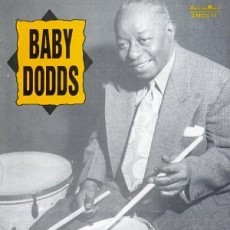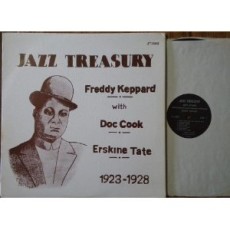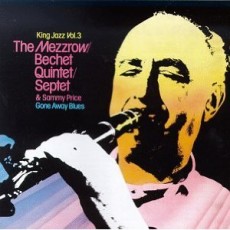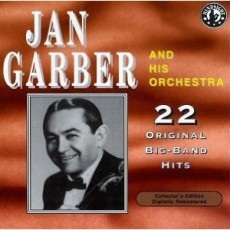
Daily Dose Of Jazz…
Warren “Baby” Dodds (pronounced “dots”) was born on December 24, 1898 in New Orleans, Louisiana. He was the younger brother of clarinetist Johnny Dodds and is regarded as one of the very best jazz drummers of the pre-big band era, and one of the most important early jazz drummers. Some of his early influences include Louis Cottrell, Harry Zeno, Henry Martin, and Tubby Hall.
Dodds gained reputation as a top young drummer in New Orleans, and worked on Mississippi River steamship bands with young Louis Armstrong. In 1921 moved to California to work with Joe “King” Oliver, and followed Oliver to Chicago, which would be his base of operations.
Dodds recorded with Louis Armstrong, Jelly Roll Morton, Art Hodes, his brother Johnny Dodds and by the late 1940s he worked at Jimmy Ryan’s in New York City. He also worked with Bunk Johnson when he would return to New Orleans. After suffering three strokes in 1949 and 1950, Dodds tutored and played in public irregularly, though he was unable to complete entire performances. In 1954 he played for a Natty Dominique recording session that featured bassist Israel Crosby and pianist Lil Hardin Armstrong.
Dodds was among the first drummers who improvised while performing to be recorded. He varied his drum patterns with accents and flourishes, and he generally kept the beat with the bass drum while playing buzz rolls on the snare. This play would be a long roll that lasted till the following beat, which created a smoother time feel that he later developed into the jazz ride pattern most commonly used ever since. He continues to be admired for the creativity of his playing and he believed in playing something different for every chorus of every tune. Additionally Dodds is perhaps the first jazz drummer to record unaccompanied: in 1945 he recorded two solos for Circle Records, and the next year recorded a series of solos and reminiscences for Folkways Records. Baby Dodds, jazz and Dixieland drummer passed away on February 14, 1959.
More Posts: drums

Daily Dose Of Jazz…
Erskine Tate born on December 19, 1895 in Memphis, Tennessee played violin and studied music at Lane College in Jackson, Tennessee. He moved to Chicago in 1912, studied at the American Conservatory and took his first professional gig at 17. By 1918 he was an early figure in the jazz scene and leading his band the Vendome Orchestra providing music during intermission and for the silent films that were shown in the Vendome Theatre at 31st and State streets.
The band was originally a nine-piece outfit but by the mid 20s had grown to 15. Among the members were Louis Armstrong, Freddie Keppard, Stomp Evans, Buster Bailey, Fats Waller and Teddy Wilson. They recorded during the period for Okeh and Vocalion Record labels.
By 1928 Erskine left the orchestra and led a band at the Metropolitan Theatre and then the Michigan Theatre. He had a long residency at the Cotton Club and continued to lead orchestras and play for dance marathons throughout the 1930s. In 1945 he retired from active performance, opened his own studio, began teaching music and became one of the city’s top instructors throughout the 50s and 60s.
Violinist, composer, conductor and bandleader Erskine Tate passed away on December 17, 1975 in Chicago, Illinois.
More Posts: bandleader,composer,conductor,violin

Daily Dose Of Jazz…
Milton Mesirow, better known as Mezz Mezzrow was born November 9, 1899 in Chicago, Illinois. The clarinetist and saxophonist has never been ranked as one of the best jazz musicians, organizing and taking part in some magnificent recording sessions involving the best black musicians of the 1930s/40s, including Benny Carter, Teddy Wilson, Frankie Newton, Tommy Ladnier and most importantly Sidney Bechet. His 1938 sessions for the French jazz critic Hugues Panassie, which he is well-known for organizing and financing, involved Bechet and Ladnier and helped spark the “New Orleans revival”.
Mezzrow became better known for his drug-dealing of marijuana than his music. His nicknames “Mezz” and “Muggles” that became slang for marijuana were used in song, the former in the Stuff Smith tune “If You’re A Viper” and the later was the title of a 1928 Louis Armstrong recording and for a brief time was his manager.
In the mid-1940s Mezzrow started his own record label, King Jazz Records, featuring himself in groups that usually included Sidney Bechet and, often, trumpeter Oran “Hot Lips” Page. Mezzrow also can be found and heard playing on six recordings by Fats Waller and his appearance at the 1948 Nice Jazz Festival was a surprise hit.
Following that appearance he made his home in Paris, France and organized many bands that included French musicians like Claude Luter, as well as visiting American artists like Peanuts Holland, Jimmy Archey, Kansas Fields, Lionel Hampton and Buck Clayton, with whom in 1953 he made what is probably his best ever recording: a version of the Louis Armstrong classic “West End Blues”.
Mezz Mezzrow, clarinetist, saxophonist, author and colorful character died on August 5, 1972 in Paris, France.

Daily Dose Of Jazz…
Jan Garber was born Jacob Charles Garber on November 5, 1894 in Indianapolis, Indiana. He had his own band by the time he was 21. He became known as “The Idol of the Airwaves” in his heyday of the 1920s and 1930s, playing jazz in the vein of contemporaries such as Paul Whiteman and Guy Lombardo.
It was during World War II that Garber began playing swing jazz with arranger Gray Rains and vocalist Liz Tilton. However, the recording restrictions in America during the war eventually made his ensemble unfeasible, and he returned to “sweet” music after the war, playing violin with the Philadelphia Symphony Orchestra.
Jan formed the Garber-Davis Orchestra with pianist Milton Davis from 1921–1924. After parting with Davis, he formed his own orchestra, playing both “sweet” and “hot” 1920s dance music. He was hit hard by the Great depression and in the thirties he refashioned his ensemble into a big band and recorded a string of successful records for Victor.
Violinist and bandleader Jan Garber continued to lead ensembles nearly up until the time of his death on October 5, 1977 in Shreveport, Louisiana.
More Posts: bandleader,violin

Daily Dose Of Jazz…
Charles “Buddy” Bolden was born on September 6, 1877 in New Orleans, Louisiana and is regarded as a key figure in the development of a New Orleans style of ragtime music that would later come to be known as jazz.
He was known as “King Bolden” and his band was a top draw in New Orleans from about 1900 until 1907, when he was incapacitated by schizophrenia. He left no known surviving recordings, but he was known for his very loud sound and constant improvisation. Instead of imitating other cornetists, Bolden played music he heard “by ear” and adapted it to his horn. In doing so, he created an exciting and novel fusion of ragtime, black sacred music, marching-band music and rural blues.
He rearranged the typical New Orleans dance band of the time to better accommodate the blues; string instruments became the rhythm section, and the front-line instruments were clarinets, trombones, and Bolden’s cornet. Bolden was known for his powerful, loud, “wide open” playing style.
While there is substantial first hand oral history about Buddy Bolden, facts about his life continue to be lost amongst colorful myth. Stories about him being a barber by trade or that he published a scandal sheet called The Cricket have been repeated in print despite being debunked decades earlier.
Bolden suffered an episode of acute alcoholic psychosis in 1907 at the age of 30. With the full diagnosis of dementia praecox, he was admitted to the Louisiana State Insane Asylum at Jackson, where he spent the rest of his life until November 4, 1931 at age 54.
More Posts: cornet

